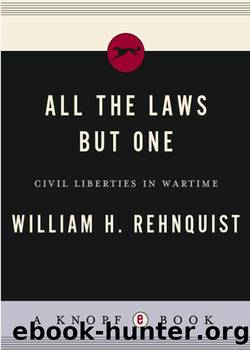All the Laws but One by William H. Rehnquist

Author:William H. Rehnquist
Language: eng
Format: epub
Tags: Fiction
ISBN: 9780307424693
Publisher: Knopf Doubleday Publishing Group
Published: 2007-12-18T00:00:00+00:00
CHAPTER 9
The Arguments in the Milligan Case
BY ADVANCING THE Milligan case on its calendar, the Supreme Court indicated that the issues presented were of extraordinary importance. The Court announced on March 5 that four attorneys might appear for the petitioners, that the Attorney General and two associates would be heard in opposition, and that three hours would be allowed each counsel. As a result, the Court heard argument in the Milligan case for more than six consecutive days.
Such extended oral arguments are unknown in the Supreme Court today. Almost without exception, half an hour is allowed counsel on each side. On rare occasions, in cases of extraordinary complexity, the time is extended to an hour and a half or at most two hours. But at the time of Milligan, the Court was accustomed to relying much more heavily on oral argument, and less on comprehensive briefs. Even so, the Court then usually permitted each side of a case two hours to argue, and thus the much greater allowance of time in Milligan showed the importance that it attached to the case.
The actual arguments began on March 6, 1866. Until 1860, the Court had sat in a small chamber in the basement of the Capitol, a location that the Justices criticized as both cramped and unhealthful. But in that year, the Court moved into new quarters previously used as the Senate chamber:
The chamber, like the basement chamber previously occupied, was semi-circular. It was forty-five feet long and the same distance wide at the widest point. The ceiling was a low half-dome, architecturally figured, with a suspended chandelier. . . . Ionic columns of marble formed a colonnade along the eastern side of the room, while pilasters of marble decorated the circular wall. Marble busts of former Chief Justices were arranged around the walls. From above the seat of the Chief Justice looked down the gilded eagle which had previously sat above the presiding officer of the Senate, while over the door facing the Justices was a white marble clock.1
On each day the justices entered the courtroom in a procession at 11 a.m. and stood behind their chairs on the bench while the crier intoned very much the same âcryâ as the marshal does today: âO Yea! O Yea! All persons having business before the Honorable, the Judges of the Supreme Court of the United States, are admonished to draw near and give their attendance, for the Court is now in session. God save the United States, and this Honorable Court.â2
The government was represented by Attorney General James Speed, by Benjamin Butler, a Massachusetts lawyer and a general in the Civil War, and by Henry Stanbery, an Ohio attorney. Of these, only Stanbery was regarded as a truly first-rate advocate.
Speed, born in Kentucky in 1812, had been named Attorney General by Lincoln in late 1864 to succeed Edward Bates. Speedâs brother, Joshua, had been a close friend of Lincolnâs during the time they had both lived in Springfield, Illinois, and Lincoln had visited the Speed family in Kentucky after Joshua returned to his native state.
Download
This site does not store any files on its server. We only index and link to content provided by other sites. Please contact the content providers to delete copyright contents if any and email us, we'll remove relevant links or contents immediately.
2010-The City & the City by China Miéville(1990)
Anatomy of Injustice by Raymond Bonner(1664)
That Every Man Be Armed by Stephen P. Halbrook(1579)
ADHD on Trial by Michael Gordon(1574)
Injustices by Ian Millhiser(1497)
You Don't Own Me by Orly Lobel(1445)
Tell by Major Margaret Witt(1438)
Course Correction by Ginny Gilder(1409)
Broken Scales by Joel Cohen(1352)
Without Copyrights by Spoo Robert(1347)
A Vast Conspiracy by Jeffrey Toobin(1327)
First by Evan Thomas(1284)
J by Howard Jacobson(1256)
A Religious Orgy in Tennessee by H.L. Mencken(1251)
The Run of His Life: The People v. O. J. Simpson by Jeffrey Toobin(1214)
A Triumph of Genius: Edwin Land, Polaroid, and the Kodak Patent War by Ronald K. Fierstein(1203)
A History Of Thailand by Baker Chris(1190)
John Wayne Gacy by Judge Sam Amirante(1114)
Law 101: Everything You Need to Know About American Law, Fourth Edition by Jay Feinman(1101)
